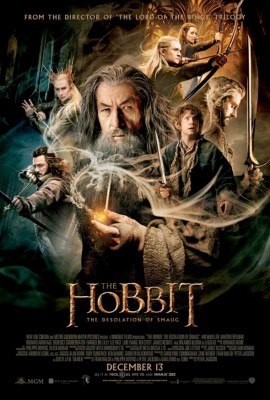 So last week I saw the new Hobbit movie, The Desolation of Smaug, and I really, really liked it … right up to the ending. Why?
So last week I saw the new Hobbit movie, The Desolation of Smaug, and I really, really liked it … right up to the ending. Why?
BECAUSE IT RESOLVED NOTHING!!!
Okay, sorry for the spoiler (though you probably should have guessed there would be spoilers in a post like this). There’s going to be more in this post, so if you haven’t seen the movie yet, read on at your own risk.
Overall, I thought the movie was pretty good. The action was fun, the fantasy elements were very well executed, and Benedict Cumberbatch was excellent as the voice of Smaug. My only real hangups (beside the ending) are relatively minor, such as the impossible physics of Thorin’s luge run down the river of molten metal, or the fact that all of the gold ever mined in the history of the Earth would not fill a tenth of the stockpile in Erebor (seriously, all of the world’s gold would only fill a cube about 20 meters to a side … so maybe half of that big statue they melted at the end?). Oh, and I thought the politics of Laketown were simplified to the point of caricature. That was actually a fairly big issue for me, though I suspect the third movie will either make it or break it.
But all of those are dwarfed (no pun intended … okay, maybe a little) by the movie’s biggest flaw, which is that IT HAS NO RESOLUTION.
Seriously, none of the half-dozen subplots resolve in any meaningful way. The one that comes closest is that love affair between the elf woman and the dwarf, since I guess she kind of saves him from his orc wound. But he doesn’t even regain consciousness, which means that they aren’t even really reunited by the end. And as for the other storylines … well, Smaug is still alive and about to burn Laketown, Gandalf is a prisoner of Sauron, Bard is a prisoner of that fat guy who wasn’t ever in the book and the dwarves still haven’t taken Erebor.
I understand that the middle installment in a series can’t resolve everything, but I still think it should resolve something. Take The Empire Strikes Back, for example. It ends on something of a cliffhanger, but there’s still enough of a resolution that it stands very well on its own. Han Solo is frozen in carbonite, but Leia, Chewie, and the droids have escaped to safety. Luke hasn’t defeated Vader, but he has learned something that completely changes the relationship between them both. The Rebel Alliance hasn’t won yet, but they have gotten away from Hoth without being completely decimated by the Empire.
The Empire Strikes Back is not just part I of The Return of the Jedi–it stands on its own as a complete story. It bridges A New Hope and Jedi by showing the tragic failure of Luke Skywalker to defeat Vader, rescue his friends, and become a Jedi. By the end of the movie, he’s a very different person than he was at the beginning. Could the same be said of Thorin, Bilbo, and the Desolation of Smaug? Not really.
I suppose I have to be a bit cautious here, since there are those who would say that I’m guilty of this myself. I’ll freely admit that I’ve written a few cliffhanger endings, most recently in some of the Star Wanderers stories. However, I always try to resolve something, so that each book can stand at least partly on its own.
In Fidelity, for example, Jeremiah and Noemi haven’t found a home yet, but they do have one to work toward. It starts with their arrival at Oriana Station and it ends with their departure–everything that they need to do there has been done. In Sacrifice, the language barrier, cultural misunderstandings, and Jeremiah’s own personal shortcomings converge until he’s more or less forced to leave Noemi, at least temporarily. It’s not a feel-good ending, but it is a resolution of sorts. And in Reproach, Mariya comes to the horrifying realization that she’s destroyed everything that she was hoping to build.
I guess the key to bridging a series in such a way that the sequels stand on their own is to keep the individual conflicts and subplots distinct, especially the internal and external ones. For example, I thought that The Unexpected Journey had a much better ending, not because the overall plot was resolved, but because Bilbo had transformed from a homebody to an adventurer. The internal conflict had a satisfying resolution, and the growth arc had more or less come full swing. The Desolation of Smaug could have done that with Thorin, and in some ways it seemed to be trying, but by the end it just fell short.
So am I going to see the third movie? Well, yeah, so from a Hollywood perspective, I suppose the movie was a success. But I’m not as excited for it as I was for Return of the Jedi. And the lesson I’m taking from this is that cliffhangers are good, but you’ve got to deliver at least some satisfaction–you’ve got to resolve something. Otherwise, people are going to feel cheated.